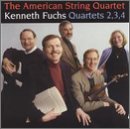| All Artists: Kenneth Fuchs Title: Fuchs: Quartets 2, 3, & 4 Members Wishing: 0 Total Copies: 0 Label: Albany Records Release Date: 10/30/2001 Genre: Classical Styles: Chamber Music, Historical Periods, Classical (c.1770-1830) Number of Discs: 1 SwapaCD Credits: 1 UPC: 034061048022 |
Search - Kenneth Fuchs :: Fuchs: Quartets 2, 3, & 4
 | Kenneth Fuchs Fuchs: Quartets 2, 3, & 4 Genre: Classical
|
Larger Image |
CD Details |
CD ReviewsString Quartet Writing is Alive and Well J Scott Morrison | Middlebury VT, USA | 01/11/2003 (5 out of 5 stars) "String quartet writing is alive and well in America. Before I bought this CD I had never heard of Kenneth Fuchs. But members of the American String Quartet are old friends and I typically buy their new releases. I'm glad I did.Fuchs, Director of the School of Music at the University of Oklahoma, and formerly Dean of Students and Academics at the Manhattan School of Music, is a real composer. On the basis of these three quartets, one can say that he has a genuine lyrical gift, as well as a masterful sense of form, expert counterpoint, rhythmic verve, and drama. The Second Quartet has five movements inspired by five different pieces of Robert Motherwell, whose collages the composer had first seen in New York in 1984. Full-color photographs of the five collages are included in the liner notes and it was helpful to look at them while listening to the music. Fuchs's style is generally tonal, but with enough spicy dissonance to make the harmonies interesting, and there are even some serial sections which, however, are still tonal-sounding. If I had to compare his sound to any other composer's, I'd probably have to mention that of Shostakovich; what composer writing quartets in the second half of the 20th century could avoid his influence? Shostakovich's hollow-eyed terror, however, is missing. And occasionally, as in the second movement, there is a melismatic ecstasy reminiscent of Vaughan Williams's 'The Lark Ascending.' The third movement combines elements of the first two, while responding to 'The Marriage', one of Motherwell's pieces, and, in the composer's wry comment, 'it ends badly.' The fourth movement functions as the work's development and leads to the fifth movement, which one could consider the quartet's recapitulation; the musical landscapes of the earlier movements are recalled in an affirmative mood.The Third Quartet, in three movements and subtitled 'Whispers of Heavenly Death', was composed 'as a gift for the American String Quartet,' after they had toured with the Second Quartet. Each of the movements has an epigram from Whitman's 'Darest Thou Now O Soul.' The materials in the three movements are related, and like the working-out of the materials in Bartók's 'Music for Strings, Percussion and Celesta', the harmonic language becomes more diatonic as the work progresses, with an accompanying easing of tension. Like the Second Quartet, this one ends on an affirmative note.The Fourth Quartet, subtitled 'Bergonzi', was written for the Bergonzi Quartet, in 1998. Its one ten-minute movement has three distinct sections -- Energico - Meno mosso - Vivo -- played without interruption. The first section introduces a tremolo figure on the viola followed by a lyrical, almost swooning, figure on the cello and these become the major figures in the succeeding lyrical second and energetic third sections. This CD probably represents the last ASQ recording that includes their founding cellist, David Geber, who became head of the Manhattan School's string department in 2001. I haven't heard his successor, Margo Tatgenhorst, yet, but look forward to hearing the ASQ next week. And, frankly, I'm hoping they will play one of Fuchs's quartets. As for this particular recording, I can only quote the reviewer in American Record Guide: "Quartet recordings don't get any better than this."" I second the nomination! Dr. Debra Jan Bibel | Oakland, CA USA | 10/06/2008 (5 out of 5 stars) "J. Scott Morrison's review of this album is very thorough, and I have little to add, except that I, too, am pleased with this accessible group of quartets with a strong American flavor. These rich works are complex in their energy and flow, of both emotion and intellect, and are highly engrossing. Kenneth Fuchs is largely conservative or traditional in his classical compositions. There is no wild experimentation, pulsing, or bombast. Instead, there is much melodic depth here. Quartets pose significant challenge for the composer in providing full interplay of the instruments; he accomplished this task remarkably well, and I warrant that the musicians truly enjoyed performing the works, that their smiles on the cover do indeed reflect the artistic and poetic spirit that inspired the music. As for me, there too is a smile on my face as I listen to these fine pieces. Encore! Encore!"
|

 Track Listings (9) - Disc #1
Track Listings (9) - Disc #1